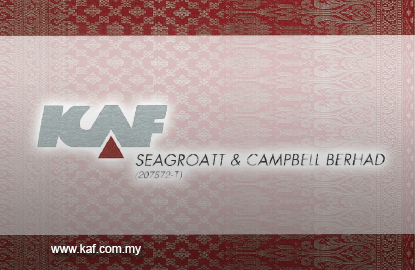
THE move by the KAF group to consolidate its stockbroking business under KAF Investment Bank Bhd is a positive one that is aimed at avoiding complications that could arise under the Financial Services Act 2013 (FSA), industry observers say.
KAF, one of the last privately owned financial services groups in the country, is majority-owned by founder Datuk Khatijah Ahmad.
On July 30, the group’s main company KAF Investment Bank came out with a proposal to buy a 76.74% stake in its sister company that runs the stockbroking business — KAF-Seagroatt & Campbell Bhd (KSCB) — for RM248.64 million, or RM2.70 a share.
It will acquire the 76.74% stake in public-listed KSCB (fundamental: 1.25; valuation: 1.40) from Khatijah’s investment vehicle Akka Sdn Bhd, Akka Holdings Sdn Bhd (a subsidiary of Akka), Khatijah and Thariq Usman Ahmad.
KAF Investment Bank also plans to undertake a mandatory general offer (MGO) for the remaining stake in KSCB at RM2.70 a share, a nearly 30% premium over the last-traded price of RM2.08 before the proposal was made. It is believed that the investment bank will end up taking KSCB private.
The restructuring would result in KAF Investment Bank becoming the holding company for the KAF group’s financial services-related entities.
“It is in line with the requirements of Bank Negara Malaysia to promote the creation of [a] ‘financial group’ under Part VII of the Financial Services Act (FSA),” KAF Investment Bank said in a statement to the stock exchange on July 30, explaining the rationale for the corporate exercise.
It said the consolidation of KSCB under KAF Investment Bank will enable the latter to become a more diversified financial services group.
Industry observers say the restructuring exercise makes sense as, under the present group structure, Akka is the ultimate holding company for the entities. And as the holding company, it would be caught under Part VII of the FSA, which states that any company holding more than 50% in a licensed financial institution would have to apply to the central bank to be approved as a financial holding company (FHC).
FHCs have to come under Bank Negara’s oversight.
“Technically, Akka would have had to become an FHC, and as an FHC, it would have to comply with certain capital ratio requirements. But it doesn’t make sense for Akka to be a FHC, especially since it’s just a private investment vehicle,” a banking analyst tells Digitaledge Weekly.
Observers note that post-acquisition, KAF Investment Bank would be structured more like other investment banking groups in the country, in that the stockbroking business comes under the investment bank.
“KAF group was the only financial group operating its investment bank and stockbroking businesses separately. From a regulatory perspective, it’s a bit inconsistent, so I wouldn’t be surprised if there might have been some pressure from the central bank for them to [consolidate the two],” says an observer.
He also points out that KAF Investment Bank, which will become a more diversified financial services group after its acquisition of KSCB, inadvertently becomes a more attractive merger and acquisition target should Khatijah be looking to sell the business.
“It gives the potential buyer a wholesome model to take away,” he remarks.
A banking analyst says: “I don’t know if that was the primary motivation for the restructuring, but it definitely helps [improve sale prospects].”
Despite its commendable performance, many have wondered about KAF Investment Bank’s long-term survival in an industry that is likely to consolidate further as business and regulations get tougher. They also point out that Khatijah, who is in her 70s, will eventually have to think about retirement.
She holds an 80% stake in KAF Investment Bank’s ultimate holding company, Akka.
KAF Investment Bank, the main earnings generator for the KAF group, is one of only three non-bank-backed investment banks (IB) in the country, the others being Kenanga Investment Bank Bhd and MIDF Amanah Investment Bank Bhd.
The low-profile unlisted entity is the second largest IB in Malaysia by asset size, with total assets of RM9.86 billion as at end-May. The largest, RHB Investment Bank Bhd, has total assets of more than RM13 billion.
KAF Investment Bank has emerged as one of the more profitable IBs in recent years despite the more challenging times, outdoing even some of the big names in the industry.
It registered a higher profit before tax (PBT) of RM169.42 million for the financial year ended May 31, 2014 (FY2014) compared with RM115.29 million the year before, boosted by a one-off gain of RM86.3 million from litigation recovery.
Its niche is in the investing and trading of money market and fixed income securities, from which it derives the bulk of its earnings.
KSCB generates most of its earnings from the stockbroking business, but it also does fund management and research.
Two weeks ago, it reported a sharp 71.9% drop in its net profit for the full year ended May 31, 2015 to RM4.19 million from RM14.93 million in the year before. Revenue was down 15.5% to RM42.93 million due to lower brokerage fees amid the soft market.
This article first appeared in digitaledgeWeekly, on August 10 - 16, 2015.